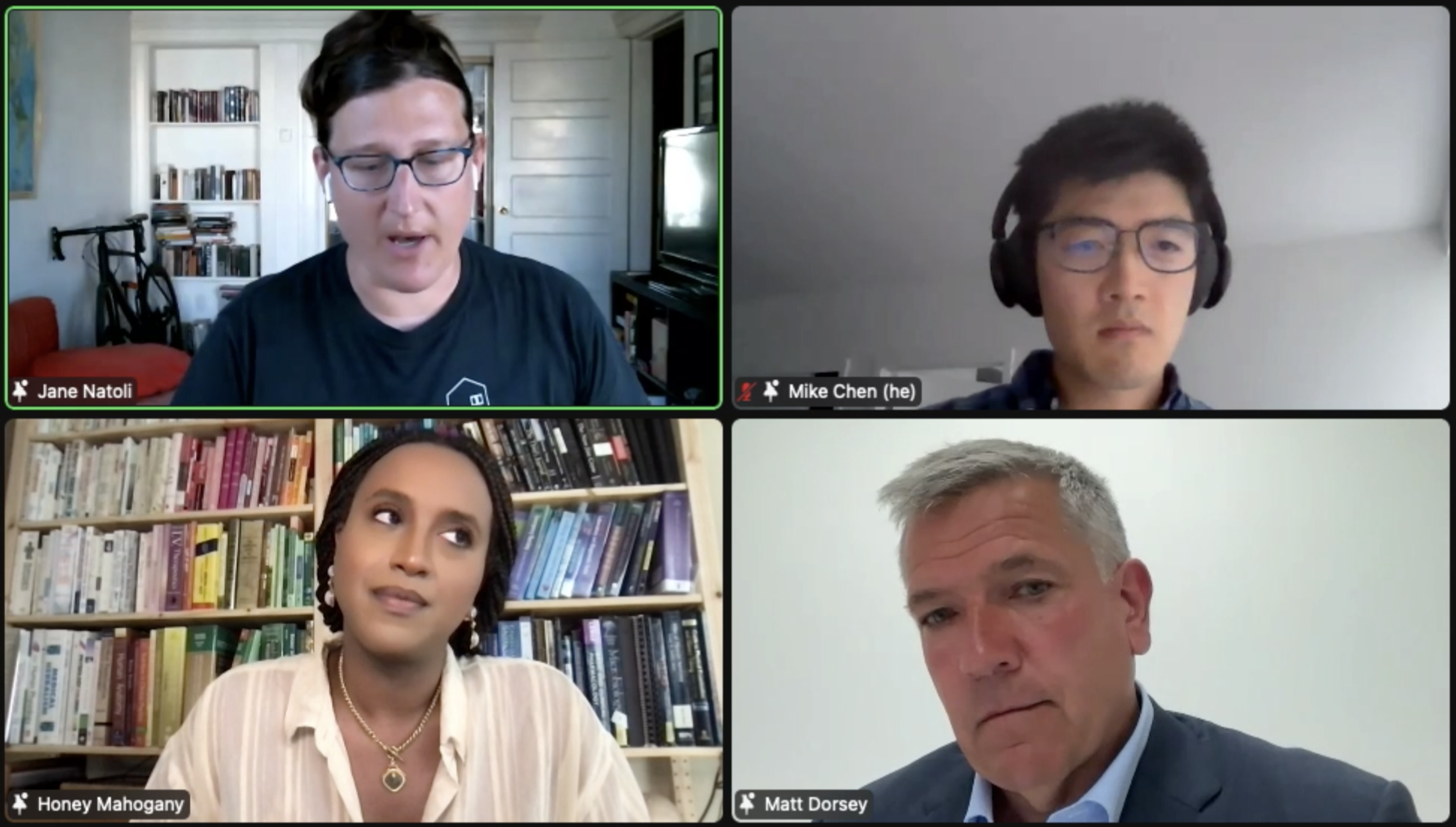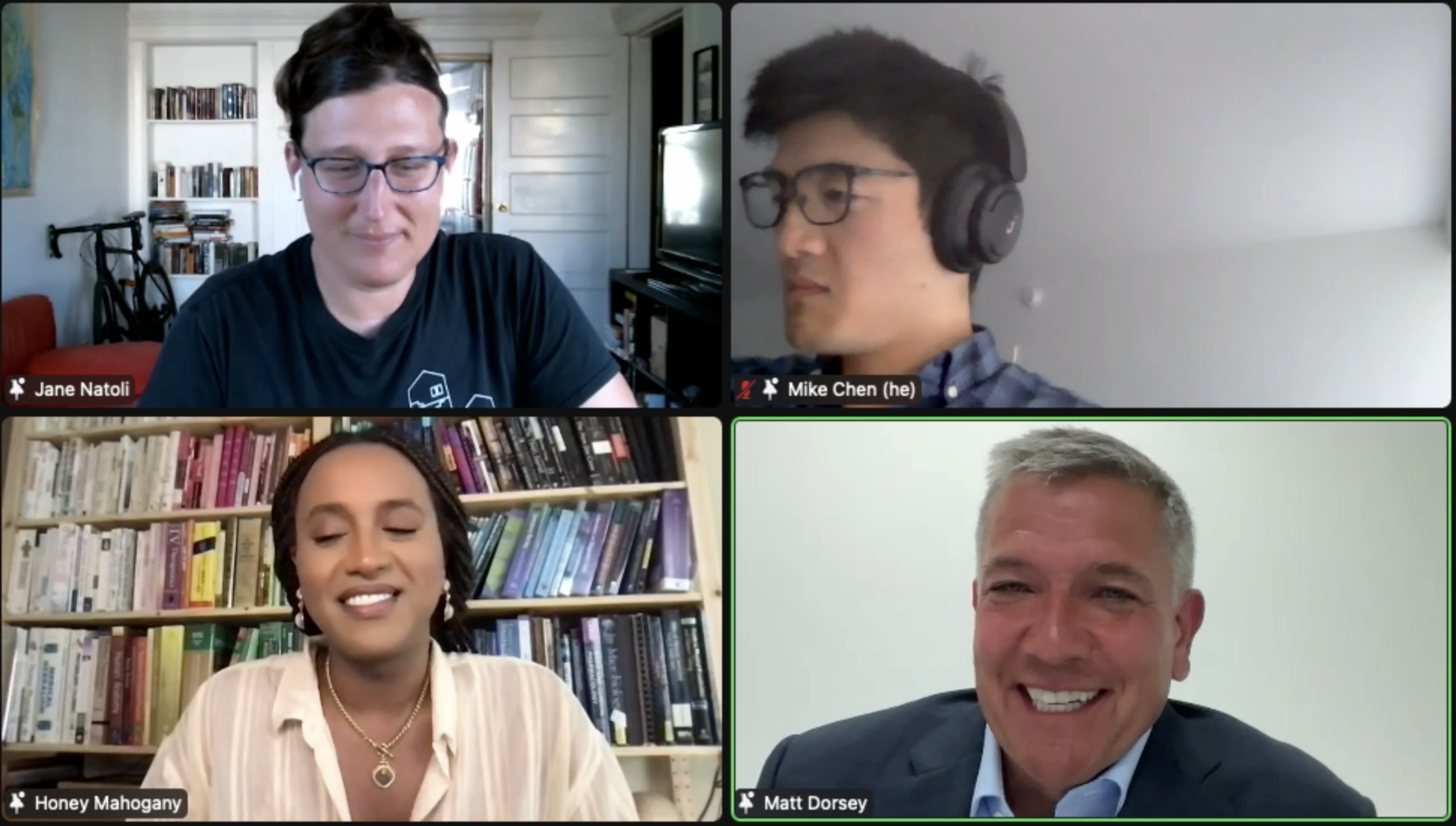District 6 Supervisor Matt Dorsey and main election challenger Honey Mahogany touted their records on housing—and exchanged occasional barbs—at an Aug. 22 forum sponsored by SF YIMBY, the housing advocacy group.
As in previous debates, Dorsey and Mahogany were largely aligned on policy questions, with both enthusiastically supporting housing reforms. But with SF YIMBY’s endorsement meetings fast approaching, the candidates also dragged out policy skeletons in the hopes of sowing doubts about their opponent’s pro-housing bona fides.
Among those housing reforms is Proposition D, the Affordable Homes Now charter amendment backed by pro-housing groups on the November ballot. It faces off against Proposition E, the Affordable Housing Production Act, chiefly sponsored by Supervisor Connie Chan, which is ostensibly similar to Prop E but reviled among housing advocates.
Prop E is the subject of a lawsuit claiming that it’s a “poison pill” against Prop D and meant to confuse voters. Meanwhile Prop D’s campaign continues to accrue a significant campaign war chest, with the latest contribution of $100,000 from Twitch founder Emmett Shear, according to recent campaign finance reports.
The dueling measures are a crucial litmus test for the District 6 candidates, who both voiced support for Prop D early on.

Then came the pot-shots. Mahogany was first to bring up that Dorsey had supported the Mission Moratorium, a controversial 2015 proposal to block housing construction in the district, when he served on the Democratic County Central Committee. Dorsey shot back, noting that Mahogany, now chair of that body, refused to take a position on Prop E at the committee, appearing to undermine her support for Prop D.
Bummed to report that the @SFDemocrats (opens in new tab) went with the anti-housing measure. Here is the unofficial vote count. pic.twitter.com/oDuJH9I8lT (opens in new tab)
— Corey Smith 陈锐 (@coreysmith_17) August 13, 2022 (opens in new tab)
Mahogany deflected, affirming an emotional connection with housing issues, noting that “virtually all” of the people she grew up with in the city have now been priced out, due to what she described as “anti-housing and racist, classist and discriminatory policies which have governed the city’s planning for far too long.”
She reiterated her record of work as chief of staff under Dorsey’s predecessor, Matt Haney, fighting for projects like 469 Stevenson, and success in adding 9,000 new dwellings to District 6.
Dorsey also characterized his support for housing through an equity lens, equating it with his work for marriage equality.

Dorsey decried the “performative politics” of his board colleagues, who he blamed for the city’s housing crisis. He cited the city’s housing element plan, and working in partnership with the state to ensure that San Francisco can build 82,000 new dwellings by 2030, as instrumental to his overall legislative agenda.
“If you asked me five years ago what was the most important work I’ve done in my career, I would’ve said marriage equality. If you asked me now, I’d say 21st Century police reform,” Dorsey said. “But if you asked me by the end of my second term, it’s going to be fulfilling the promise of the housing element.”
Asked how he would hold board colleagues’ “feet to the fire” on housing, Dorsey promised to be both conscience and Cassandra.
He said he’s willing to take “brave votes” and work to reform processes, but is also cognizant that the state may take the lead on the issue. The state could threaten sanctions such as pulling transit funding or local planning control, said Dorsey, and the situation may need to hit bottom before real change begins.
Meanwhile, Mahogany said she’s willing to engage and “build bridges” with opposing factions to achieve progress, while holding the line on policy goals.
“I’ll be the first to say this: the era of supervisorial prerogative is over,” said Mahogany, referring to the legislative custom of allowing district supervisors to have the heaviest say over projects in their own districts.
“After 469 Stevenson, it’s really clear to me that we need fundamental change in the way we approve housing,” Mahogany said. “Hundreds of housing units should not be used as a political leverage point in the middle of a housing crisis.”
Mahogany also offered up comprehensive area plans, such as the Eastern Neighborhoods, Western SOMA and Market and Octavia Boulevard plans, as vehicles for upzoning. She also suggested a Housing Ombudsman Board, conceived with help from housing advocates and labor groups, to help cut red tape for smaller projects.
So with both candidates voicing strong commitments to more housing, who was the real winner of the debate?
It may well be the YIMBY movement itself, and how it has arrived politically.
“It’s interesting to see how they are positioning themselves for the future,” said Jane Natoli, a lead at SF YIMBY and moderator of the debate. “Whoever wins is going to be the most pro-housing voice on the board from day one.”
